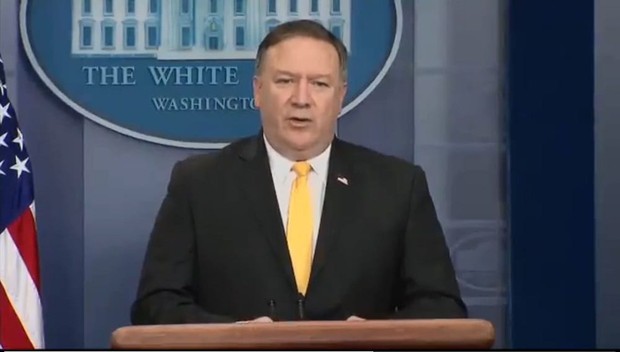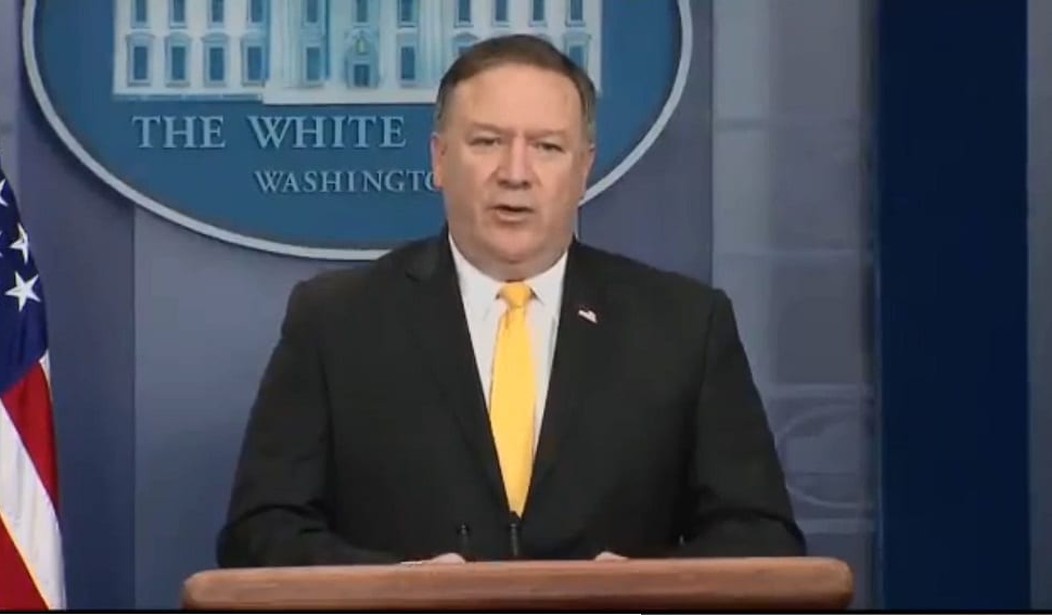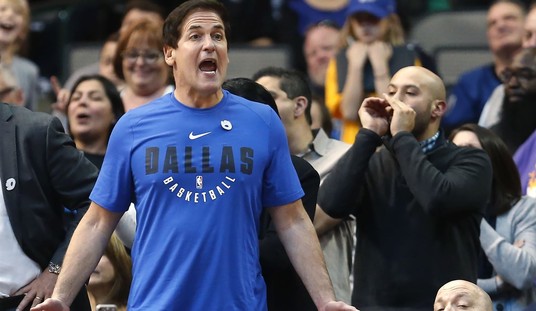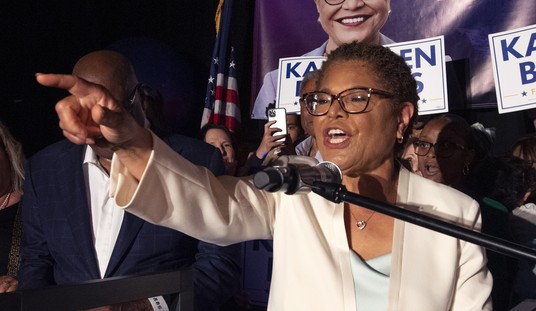
Q Thank you. What progress have you made in narrowing the gap in your understanding of denuclearization and North Korea’s definition of denuclearization? Has there been progress in bringing that definition closer together?
SECRETARY POMPEO: Yes.
Q Can you describe that a little bit?
SECRETARY POMPEO: No.
This is key. Historically, when North Korea has talked denuclearization it has meant the US foreswearing the use of nuclear weapons against North Korea if North Korea gives up its nukes. The fact that this issue has been addressed and a common definition may be within grasp is a sign that a) a helluva lot of progress has been made in the preparatory talks and that only happens if Kim Jong Un wants it to and b) that some sort of actual agreement may be possible. The fact that Pompeo won’t talk about it indicates that it is both sensitive and fluid and trying to define something publicly that Kim will be asked to agree to might present difficulties later on.
Q Mr. Secretary, first of all, the President said that he doesn’t believe he needs to prepare very much ahead of this summit. Do you think that’s a prudent approach?
And also, I want to get your reaction to Rudy Giuliani’s comments that “Kim Jong Un got back on his hands and knees and begged” for the summit to go back on — whether you think he should be weighing in on these international affairs and whether you agree with that assessment.
SECRETARY POMPEO: So back to your second question. I took him as it being a small room and not being serious about the comments. I think it was a bit in jest, and —
Q Do you think it could jeopardize the summit or —
SECRETARY POMPEO: We’re moving forward. We’re focused on the important things. I know Rudy. Rudy doesn’t speak for the administration when it comes to this negotiation and this set of issues.
With respect to your first question, you know, progress — we’re making progress, inch by inch. And we’re going to travel there. This is different. The approach that President Trump is taking is fundamentally different. In the past, there have been months and months of detailed negotiations, and it got nowhere. This has already driven us to a place we’ve not been able to achieve before.
Pompeo distances administration from Giuliani's North Korea comments: "Rudy doesn't speak for the administration when it comes to this negotiation and this set of issues." https://t.co/NZFGIEkz9Z pic.twitter.com/T3CWiGBe2B
— ABC News (@ABC) June 7, 2018
I think Trump’s approach, at least as far as I understand it, is to deal with Kim as one head of state to another, not as a policy wonk. He should have some broad parameters of things he’s after, he should know the key words and concepts used by the North Koreans. He should strive to achieve some sort of level of rapport with Kim, try to develop deals defined at a higher level, and then both sides should turn to their staffs to work it out. As much animosity as has characterized the US-North Korea relationship, going in with a lengthy agenda would be folly. But a short list of big things—a permanent peace agreement between the US and North Korea and a favorable decision on nukes and missiles—and maybe a little thing—return of the USS Pueblo—could be game changers.
Q Just having met the man twice now, what can you tell us about what opinions you’ve formed of Kim Jong Un as a person?
SECRETARY POMPEO: Yeah. So I haven’t spent that much time with him. What I have said publicly is he has indicated to me, personally, that he is prepared to denuclearize; that he understands that the current model doesn’t work, that he’s prepared to denuclearize.
And that, too, he understands that we can’t do it the way we’ve done it before — that this has to be big and bold, and we have to agree to making major changes. We can’t step through this over years, but rather need to acknowledge it will take some amount of time, that this doesn’t happen instantaneously. But that the model for succeeding — security assurance; and political normalization; and denuclearization completely, verifiably, and irreversibly — for that to take place, we’ve got to make bold decisions.
And I’m hopeful that Chairman Kim Jong Un is prepared to make that decision for his country. A big shift in his strategic understanding of his security.
Secretary of State Mike Pompeo said Kim Jong Un "has indicated to me that he is prepared to denuclearize." pic.twitter.com/4Hv3ElKgOp
— POLITICO (@politico) June 7, 2018
Again, the idea that both sides want to accomplish big things rather than play small ball is here.
Q Thank you. So you said that you — that the President is prepared to talk about security guarantees for North Korea. We have seen in this administration that you can — that when new administrations come in, they can undo things that prior administrations have done. How can President Trump guarantee long-term security for North Korea and for Kim, in particular?
SECRETARY POMPEO: Well, look, we’re going to have to do things that convince Chairman Kim that that’s the case. All right? That’s what we’ll have to do.
So let me give you an example. We are hopeful that we will put ourselves in a position where we can do something the previous administration didn’t do. Right? They signed a flimsy piece of paper, and we’re hoping to submit a document that Congress would also have a say in — that would give currency and strength and elongation to the process, so that when administrations do change, as they inevitably do, and this one will — six and half years from now — when that takes place, that Chairman Kim will have comfort that American policy will continue down the same path, on the course that we hope we’re able to set in Singapore.
Reporter: How can Trump guarantee longterm security for North Korea?
Pompeo: [The Obama administration] signed a flimsy piece of paper. We’re hoping to submit a document that Congress would also have a say in. pic.twitter.com/R2UbLSx544
— POLITICO (@politico) June 7, 2018
This is what it should be. No president should attempt to bind the nation to a long-term course of action without going to the Congress, at a minimum, and ideally to the Senate for a ratified treaty.
Q Mr. Secretary, can you explain the President’s shift — when he’s gone from talking about defining success for this meeting as denuclearization of the Peninsula, to now talking about the need for more meetings? Can you explain what happened there and why this shift? And can you also describe your disagreements over North Korea internally with the national security advisor?
Amazing. CNN reporting Pompeo told Trump it would be "counterproductive" to allow Bolton to attend the Oval Office meeting with visiting North Korean official Kim Yong Chol. Non trivial probability Bolton doesn't last much longer. https://t.co/Ri5MCb9LMp
— Tom Wright (@thomaswright08) June 5, 2018
SECRETARY POMPEO: Yeah, with respect to the second one, I’ve read a little bit about this. And I love good fiction as next as — as much as the next person, but it is without foundation, so much so that — I’ll be polite, since I’m a diplomat now. Suffice to say, those articles are unfounded and a complete joke.
I hadn’t posted on that particular story because it seems like a lot of the other personalized hit pieces that creep out of the White House. A staffer either slimes a colleague or tries to set up a food fight between some other people.
On the whole, Pompeo gives you the feeling, rightly or wrongly, that the Administration has a negotiating strategy and it has done enough prep work to believe it can succeed. I don’t know how this will all turn out but I feel that the situation is the best it has ever been for a peaceful resolution to the North Korea problem.
https://youtu.be/KETOaxD2Tto
=========
=========
Like what you see? Then visit my story archive.
Follow @streiffredstate
I’m on Facebook. Drop by and join the fun there.
=========
=========













Join the conversation as a VIP Member